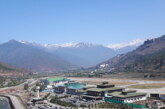Meghalaya is blessed with abundant natural resources, both renewable and non-renewable and at the same time the State has been facing formidable challenges on account of poverty, malnutrition and problems associated with environmental sustainability. The State has set for itself a growth target of 11 per cent in the XII Plan (2012-17) with thrust on reducing poverty; ensuring better livelihood opportunities for its citizens and creating necessary infrastructure for long term sustainable development.
In the year 2012, the Government of Meghalaya launched a flagship programme titled “Integrated Basin Development and Livelihood Promotion Programme” (IBDLP). The programme aims at promoting optimal and effective development and utilization of the State’s natural resources for ensuring livelihood security and inclusive growth within the broad framework of sustainable development.
The programme has been designed around four pillars- Knowledge Management, Natural Resource Management, Entrepreneurship Development and Good Governance. A significant feature of this Programme is specific mission mode interventions in Agriculture, Horticulture, Forest and Plantation crops, Aquaculture, Livestock, Sericulture & weaving, Apiculture, Energy, Water, Tourism, Skills, and Knowledge Management etc. The core objective of each of these missions is to facilitate the promotion of sustainable livelihoods for the people of the State leveraging upon the opportunities and strengths of the State’s natural resources. The Programme seeks to provide an enabling framework for uplifting the socio-economic conditions of the people, especially the less developed ones by way of promoting capacity building and entrepreneurship of the individuals as also of the communities along with other necessary measures.
The programme is not a ‘scheme’ in the traditional sense but an enabling framework in which all stakeholders – government, civil society, private sector and citizens are supposed to collaborate and work together to achieve the shared goals and common objectives. The programme is people-centric and seeks to bring about a paradigm shift in the development strategy as it moves away from the beneficiary-oriented approach to an enterprise promotion model.
A framework of governance has been created to ensure coordinated implementation of the programme. While the Citizens are at the centre of the initiative and are supposed to be the key drivers, the facilitative action on the government side is being managed with the help of new institutional mechanism that has been put in place with the Meghalaya Basin Development Council (MBDC) headed by the Chief Minister for overall policy formulation and oversight; the Meghalaya Basin Development Authority (MBDA) headed by the State Chief Secretary for steering implementation and the District. Basin Units headed by the District Collectors to ensure delivery of services at the grassroots level. The district collectors also function as the Executive Directors of the Meghalaya Basin Development Authority.
Water is another thrust area of the programme. Under the programme, various steps have been taken to ensure comprehensive water security and water use efficiency and the institutional mechanism has been re-engineered to meet the challenges in the sector. A Water Resource Council headed by the State Chief Minister, a State Water Resource Development Agency headed by the State Chief Secretary and the District Water Resource Councils headed by District Collectors have been constituted in order to ensure coordinated action on the part of various government agencies and
community organizations. Multi-purpose Reservoirs and small ponds called Jalkunds are being developed across the State to ensure appropriate harvesting and optimum utilization of available water resources.
Knowledge is a cross-cutting theme and forms one of the core pillars of the IBDLP. With this in mind, the State government
has created knowledge based institutions – Meghalaya Institute of Entrepreneurship (MIE), Meghalaya Institute of Governance (MIG) and Meghalaya Institute of Natural Resources (MINR).These institutions are not only involved in the generation of knowledge but also in creation of actionable knowledge in partnership with the stakeholders.The knowledge accumulated is then used to help the entrepreneurs.
Existing institutions have been re-engineered and new institutions promoted wherever necessary to take up challenges in different related domains. Meghalaya State Skills Development Society, State Council on Climate Change and
Sustainable Development, Bio-Resource Development Centre, Centre for Adaptation to Climate Change etc., have been developed to support implementation of the programme.
The Entrepreneurship Facilitation Centres set up at grass root level in every district of the State are designed as a onestop-shop for providing various services to potential entrepreneurs. These services include awareness, training and capacity building, credit linkage with banks, providing technology and market access.
Enterprise Resource Persons (ERP) manning the EFCs is a cadre of dedicated young professionals, who are trained to interact and understand the entrepreneurial requirements of the partners and to arrange various support services
needed by them. The entrepreneurs looking at market access opportunities are encouraged to produce not merely what they can but to produce what they can sell for profit.
The IBDLP has generated much interest and enthusiasm among the people of the State who perceive themselves as development partners under the aegis of the programme and not merely as beneficiaries. It has also received overwhelming
support from various government and non-government organizations as well as multi-lateral institutions.


